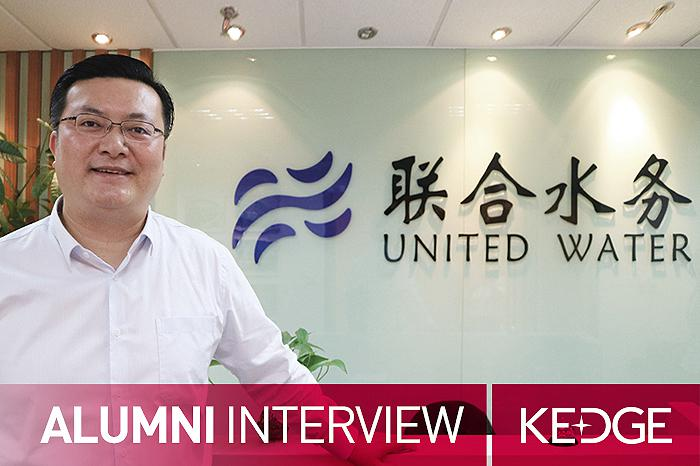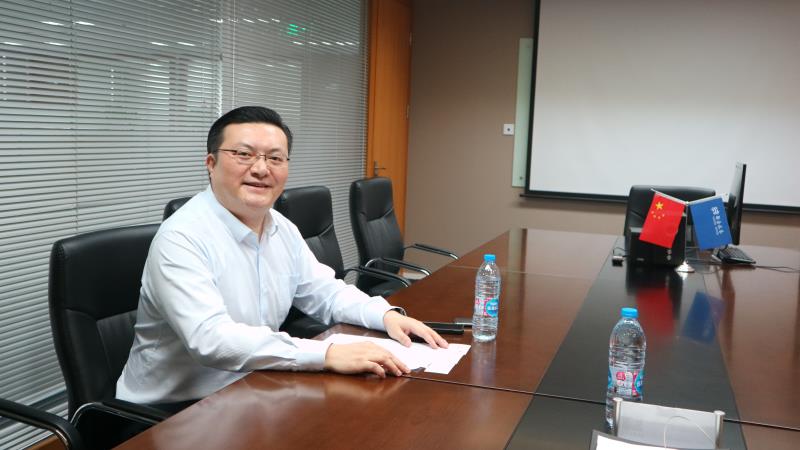KEDGE graduate Clément Pourtal's documentary wins...

Alumni Story | People Who Deal with Water Should Be Tender like Water

Mr. LIU Meng
Board Director & Vice President of United Water Corporation
KEDGE Business School-SJTU Global MBA 2007 intake
KEDGE Business School EA-DBA 2016 intake
A few years ago, while taking the Shanghai Airlines’ plane, Mr. LIU Meng read through the Shanghai Airlines magazine and saw the introduction of KEDGE-SJTU Global MBA programme. Attracted by this, he applied and was successfully enrolled. After having completed his MBA, LIU Meng hesitated to read an EMBA or a DBA, and finally decided to take the Euro-Asia Doctorate in Business Administration (EA-DBA).
Why he chose to continue the studies? It is to solve the puzzles encountered in work, instead of social networking; and the reason why the difficulties are encountered isn’t because there are not enough friends. Since he tried to make some systematic and theoretical considerations on the problems faced at work, the Euro-Asia Doctorate in Business Administration (DBA) with more emphasis on academic research is undoubtedly a better choice.
At the beginning of his MBA learning, Mr. LIU Meng encountered a "common problem" like his classmates: he always wanted to build a set of universal theories. After the "blow" of the professor, he became rational, narrowed and refined the initially set up research topic about the influence of Chinese culture on enterprises, departments and teams to a more elaborate foothold——When private water supply enterprises have purchased the state-owned ones, what role can the corporate culture play in the process of enterprise restructuring? LIU Meng has accumulated a lot of experience in his work practice on this research topic, which has hardly been involved in so far.
![]()
"You can't just talk about difficulties and do nothing.”
Domestic urban water supply in China was always state-run, and has gradually started the open business model since 2003/2004 to encourage diversified equity operations. For some third- and fourth-tier cities, the former old water plants suffered serious losses because of poor management, but it was unable to let them go bankrupt. The local government was also more willing to introduce investors through marketization and support the transformation of water supply facilities to provide better services to the residents.
In 2004, we made the first 100% restructuring project of the original old water supply company in a prefecture-level city. Taking this project as an example, I think in the process of restructuring state-owned enterprises, there are a few things to do:
First of all, the resettlement of employees must be done well. Many of the failure cases have adopted the "shock therapy", where all the employees were directly laid off and everyone was upset.
Before signing the acquisition contract, it is necessary to fully discuss the employee settlement plan and protect the employees' rights and interests. We accepted all the employees of the old water supply company and assured them that the benefits would not be reduced after the restructuring, and would increase simultaneously with the improvement of the company's performance; the pre-commitment identity replacement fee would also be paid in time. When their rights are fulfilled, the employees are willing to accept the changes and the company will achieve a smooth transition.
Secondly, we must make great efforts on corporate culture. It's better for employees to quickly see changes both internally and externally. It is often difficult to change people’s thoughts and spirits. But you can start with the external image which is easier to get changed, such as redecorating the office, adding modern office facilities, keeping the factory tidy and clean, improving sanitary conditions, and posting some slogans, etc. When employees feel that everything is becoming more delightful, more likely they will trust investors. Once you have the trust, people will listen to you, and then it will be easier to carry out institutional reform.

Photo from www.united-water.com
Thirdly, we must increase investment. Many old equipment and pipes are outdated and require investment. You can’t hold the mentality that you are here to earn money and that you don’t want to invest for the reconstruction.
Before the reconstruction, the original old water supply company's production and sales rate was as high as 60%. It means every 100 tons of water supplied, there were 60 tons of water disappeared during the transportation process. In the end, the old water supply company could only receive the bills of 40 tons of water. Water leakage also reduced water pressure, affecting the normal water user by residents; leaked water had also bad effects on other public facilities, such as roads and pipe networks. After continuous and vigorous investment and renovation, the city's production and sales rate has been reduced to 12%. And the water pressure is enhanced, therefore residents can use water more easily.
Fourthly, we must improve the quality of service, especially in daily life details. People who deal with water should also “be tender like water” with users.
Previously, only two or three sales outlets in the entire city could deal with water bills. Thanks to the cooperation with banks, we launched a service in line with the convenience of residents. Through their network advantage, we can entrust banks to collect water bills; electronic payment channels such as WeChat, Alipay have also been opened; the official WeChat platform of our company has also been set up. “Company Open Day” is organized every year, residents and corporate representatives are invited to visit the water plant, enabling the public to understand the process, technology and pipe network construction of water supply. When everyone understands that the water supply is not easy, they will support relevant work of the company. For instance, raising a little bit water prices will not be criticized.

Photo from www.united-water.com
Fifthly, we must ensure social and economic development of the city. Economic efficiency and social responsibility should be balanced to achieve sustainable development of the company.
For example, in the newly built district, it is difficult to reduce the input cost of the pipeline network construction because of the small population and low water consumption in the early stage, but it is impossible to stop water supply even if there are potential economic losses. Water companies must bear the overall situation in mind. We can’t only talk about difficulties and do nothing. Firstly, we must find ways to overcome difficulties, improve the citizens' livelihood, facilitate the local social and economic development to ensure the satisfaction of all parties. The government will also understand the difficulties of water supply enterprises and will give more support to achieve a win-win situation for people, government, water supply enterprises, employees and investors.
The practical experience of corporate culture construction in urban water supply reconstructions in cities such as the prefecture-level ones mentioned above has contributed to the research direction of Mr. LIU Meng's doctoral thesis. With frequent business trips and a lot of social engagements, he said frankly: the biggest problem with learning at present is that there is too little time to read, so he is under great pressure to complete the literature review in the DBA doctoral thesis. However, the academic atmosphere in the class has always inspired him. He did not look for a ghostwriter and lived up to the original academic intention. He stuck with it and has gained some accomplishments.
Different cultures are also applied to different departments within the company, for example, R&D department attaches great importance on innovation; while business department is partial to performance.
“Let corporate culture serve the overall corporate goals”

There may be four cultural forms in companies: harmonious family culture, free and innovative culture, market-oriented culture with a focus on performance, strict organizational culture of obedience and execution. These four can exist simultaneously in one company without conflict. It depends on which stage the company is in, whether it is a start-up period or a development period. Different cultures are also applied to different departments within the company, for example, R&D department attaches great importance on innovation; while business department is partial to performance.
Corporate culture presents a complex form in the enterprise, leaders should be proficient in using various forms of corporate culture, which ultimately serve the overall goals of the company.
Article from Shanghai Airlines, Jul.2018
Written by Ms. BIAN Lingli






0 Comment
You must be logged in to leave a comment.
No comment